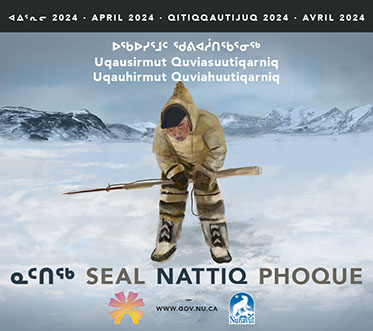Inuit need to “take ownership of the education system,” says Simon
Inuit Tapiriit Kanatami’s Amaujaq National Centre for Inuit Education meets in Iqaluit

Annie Popert, the executive director of the Kativik School Board, second from right, and Natan Obed, director of social and cultural development at Nunavut Tunngavik Inc., were among those at the Feb. 21 news conference to discuss this past week’s meeting of the Amaujaq National Centre for Inuit Education in Ottawa. (PHOTO BY SAMANTHA DAWSON)
On some days in Nunavik, kids are sent home from school because there are no teachers to teach them.
That reflects the dismal state of the education system in the North, said Annie Popert, the executive director of the Kativik School Board.
“We’re sending the kids home every single day, because there’s no teacher. We have [only] floating, replacement teachers traveling through Nunavik,” Popert said.
Popert, along with representatives from Inuit Tapiriit Kanatami’s Amaujaq National Centre for Inuit Education, Inuit organizations and governments, met with Inuit and university researchers this past week in Iqaluit to talk about implementing the 10 recommendations contained in ITK’s national strategy on Inuit education.
Popert and the other participants came to a three-day meeting in Iqaluit.
The gathering was hosted by Inuit Tapiriit Kanatami’s Ottawa-based Amaujaq National Centre for Inuit Education and led by Mary Simon, chair of ITK’s Inuit education committee and Natan Obed, director of social and cultural development at Nunavut Tunngavik Inc
Its purpose: to figure out priorities for the “recovery” of the education system, Popert said..
Or, as Simon put it, “revitalizing the education system to take ownership of the education system.”
“It’s going to evolve over time, and we can’t do all the recommendations all at once,” Simon said at a news conference Feb. 21, the only part of the event that was opened to reporters.
The recommendations raised by participants included the need to develop a strategy to help parents in the Inuit regions support their children to stay in school and not drop out.
“If we are going to improve our graduation rates, we need to know why our children are dropping out of school to begin with. We need to understand how our children learn, how child-rearing practices influence learning and how early literacy affects success later in life,” Simon said.
For the meeting, researchers, who looked at more than 300 research papers on Inuit and indigenous education, found that First Nations research dominated the literature.
Conference participants want more research on Inuit education.




(0) Comments